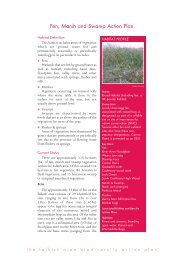the Forth Valley Sensory Centre newsletter - Falkirk Council
the Forth Valley Sensory Centre newsletter - Falkirk Council
the Forth Valley Sensory Centre newsletter - Falkirk Council
Create successful ePaper yourself
Turn your PDF publications into a flip-book with our unique Google optimized e-Paper software.
vision, visual systems, and vision information processing. In Scotland,<br />
community optometrists provide primary vision care including sight<br />
testing and correction. They can diagnose and treat some eye diseases,<br />
and if necessary <strong>the</strong>y can refer patients to an ophthalmologist. Hospital<br />
Optometrists work ei<strong>the</strong>r independently or toge<strong>the</strong>r with ophthalmologists<br />
and orthoptists in <strong>the</strong> treatment and management of patients with various<br />
eye conditions in <strong>the</strong> outpatient clinics. Optometrists complete an<br />
undergraduate honours degree and a one-year "pre-registration period"<br />
where <strong>the</strong>y complete clinical practice under supervision before <strong>the</strong>y are<br />
eligible to register as an optometrist with <strong>the</strong> General Optical <strong>Council</strong><br />
(GOC)<br />
Optician<br />
Often confused with an optometrist, an optician is someone who makes<br />
and dispenses spectacles and contact lenses but does not carry out<br />
medical tests or treatments.<br />
Orthoptist (from ortho – straight and optikas - vision) Orthoptists deal<br />
with <strong>the</strong> diagnosis and treatment of problems with eye movement and<br />
coordination, and <strong>the</strong>y specialise in <strong>the</strong> management of visual<br />
development. They are highly skilled in assessing children’s vision but<br />
also diagnose and treat adults; <strong>the</strong>y get involved in <strong>the</strong> assessment of<br />
functional vision, <strong>the</strong> diagnosis and treatment of conditions such as<br />
dyslexia and carry out visual screening for children. They work alongside<br />
<strong>the</strong> ophthalmologists in making decisions about when and what surgery<br />
to carry out, and also work independently or alongside <strong>the</strong> optometrists.<br />
Orthoptists complete an undergraduate degree course during which <strong>the</strong>y<br />
have a number of clinical placements. Once qualified <strong>the</strong>y are registered<br />
with <strong>the</strong> Health Professions <strong>Council</strong><br />
Ophthalmic nurses All nurses training today do a 3 year undergraduate<br />
degree, which allows <strong>the</strong>m to register with <strong>the</strong> Nursing and Midwifery<br />
<strong>Council</strong>. They may <strong>the</strong>n choose to take fur<strong>the</strong>r post graduate education<br />
relating to ophthalmology, or gain experience by working in <strong>the</strong><br />
speciality. Nurses work across all of <strong>the</strong> areas of <strong>the</strong> ophthalmology<br />
department; many have developed a wide range of technical skills, but<br />
<strong>Forth</strong> <strong>Valley</strong> <strong>Sensory</strong> <strong>Centre</strong> Newsletter - Autumn Edition Page 13

















